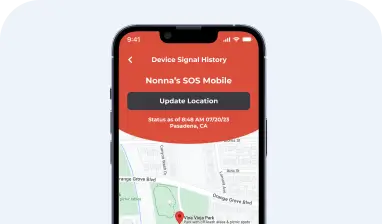As your loved one ages, there can come a time when you are not sure if living at home alone is the safest decision. Whether your loved one is living with Alzheimer’s disease or another type of dementia, another condition that affects their ability to perform activities of daily living, or a mental health condition that is exacerbated by feeling lonely or isolated at home, exploring potential solutions can feel overwhelming and even confusing.
Depending on your family culture, you might feel like it is your responsibility to move your aging loved one into your home. Or you might wonder if you need to move in with them. While these are two potential solutions, they are not the only ones. Does your aging loved one need to live with you as they age? No. You get to decide what is best for you, your family, and your aging loved one.
Here’s what you need to consider when weighing your options.
Moving Your Loved One Into Your Home
While multigenerational households are not as common as they were decades ago, there has been a resurgence in the past few years. Today, adults are choosing to look for homes that feature “in-law” suites or spaces so that senior family members can move in without anyone sacrificing their space.
If you are considering moving your loved one into your home, here are a few questions to ask yourself as you determine if this is a good move for both of you:
- Do you have space in your home for your loved one to live? At minimum, they would need their own room in your home.
- Is your home accessible for their current, and future, mobility needs? For example, you would need to have wide doorways and hallways, as well as a shower and bedroom on one floor to eliminate the need for navigating stairs.
- Do you need to oversee your loved one around-the-clock? Do you plan on still working outside of the home? Who will oversee your loved one during the times you are out of the house?
- How comfortable do you feel attending to the personal care needs of your aging loved one? How comfortable do they feel with you assisting with those tasks?
- What is your emergency plan? Do you know what to do if your loved one falls or experiences another medical crisis?
- How do the other people in your family feel about sharing their spaces with your aging loved one?
- Will your loved one contribute in some way financially to the home? What will that look like? If you have any siblings, what do they think about your loved one giving you money for household expenses?
- What is your plan for when you leave the home for vacation, work trips, weekends away, etc.? Will your loved one come with you? Will you need to find some type of respite live-in care?
Moving Into Your Loved One’s Home
More than 75% of seniors want to live in their home for as long as possible, according to the AARP. However, remaining in their home of choice is not always the safest option, especially if they are living alone. You might find that moving into your loved one’s home would work best for you and for them.
Here are questions to ask yourself before making this decision:
- What will you do with your current home? Sell it? Rent it out?
- Will you be contributing financially to the household? What are those expectations? If you have siblings, what do they think about the financial aspects of you moving into the home with your loved one?
- Do you plan to work outside of the home? If so, who will oversee your loved one’s needs and safety while you are away?
- Do you have a designated living space? Ideally, you would have your own bedroom and bathroom.
- What is your plan for when you want to take a vacation or business trip? Who will move into the home while you are gone to oversee your loved one’s needs?
For further tips on ensuring a safe home for your aging loved one, get our free Caregiver’s Guide to Aging in Place.
Choosing Home Care Instead
In reality, moving a loved one into the family home or moving into the loved one’s home is not the best case scenario for the majority of adult children. Fortunately, there are other ways to provide your aging loved one support in the home so that they can remain as healthy and safe as possible.
Home care is an option that can keep your loved one in their home of choice while giving them the assistance they need. Here are the fast facts about this option:
- There are two types of home care: medical and nonmedical. Nonmedical home care is the most common, as it does not need to be prescribed by a physician. Nonmedical agencies provide a variety of personal care assistance, light housekeeping, transportation, companionship, and meal preparation services.
- Home care agencies send a caregiver to the home during designated shifts each day or week. Caregivers are trained by the home care agency and document their observations and services in the senior’s medical chart.
- Some home care agencies have a minimum number of hours you must book each week. If your loved one just needs a bit of help, this might not be the most budget friendly.
- If your loved one needs around-the-clock assistance or oversight, a live-in caregiver or 24-hour shift of caregivers will get expensive quickly.
- Home care services are paid out-of-pocket, but you can offset charges if your loved one qualifies for Veterans Aid & Attendance or a Home & Community Based Waiver through their state.
Choosing Senior Living Instead
Living at home might not always be the best option for a senior who requires around-the-clock supervision and assistance, or for someone who states they are lonely or isolated at home. Senior living communities, such as independent living, assisted living, memory care, or skilled nursing, offer an alternative to 24-hour home care assistance.
Here are some fast facts about senior living:
- Senior living communities typically charge a monthly fee that covers services, room, meals, most utilities, and access to community amenities.
- Senior living communities can be expensive. You might be able to offset costs by utilizing long-term care insurance, Veterans benefits, Medicaid benefits, or even Medicare (for up to 100 days per year for skilled care)
- You’ll want to get recommendations for level of care from your loved one’s physician. This will help you know what type of community to research.
- Remember that your loved one’s needs will change as they get older, which might mean they will need more care. Ensure your budget and plans forecast for this potential need.
In short, your senior loved one does not necessarily need to move into your family home. There are other options. Work with your family to find the answer that makes the most sense emotionally and financially for everyone involved.















